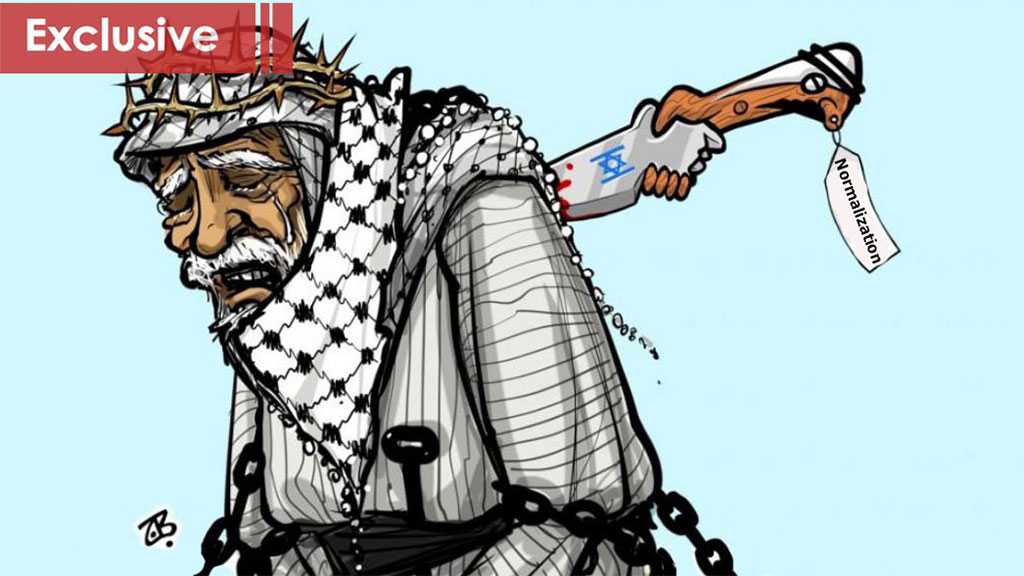
Analyst: An Islamic and United Front against Normalization

By Nour Rida
There has been recent agreements between the UAE and Bahrain with ‘Israel’ to open formal diplomatic ties as total departure from the Arab consensus over the resolution of the Palestinian issue. ‘Israel’ and the UAE on August 13 reached a deal that will lead to full normalization of diplomatic relations between the two sides, in an agreement apparently brokered by US President Donald Trump. Bahrain also signed the controversial and US-brokered normalization agreements with ‘Israel’ during a ceremony in Washington on Tuesday.
Commenting on the matter, political analyst and expert on Palestinian affairs, and also professor at the University of Tehran Dr. Hadi Borhani told al-Ahed news “At a certain point, all the countries of this region had opposed the presence of the ‘Israeli’ entity in the Middle East and this totally makes sense. ‘Israel’ and the ‘Israelis’ do not belong to the Middle East, they came from thousands of kilometers away from Europe. Their issue was an issue with Europe to begin with, and the British colonialists were the ones who exported this issue to the Middle East by bringing the ‘Israelis’ to the region. The people of the region are well aware of the Sikes-Picot agreement, the Balfour declaration issued by the British government and they saw with their bare eyes how ‘Israel’ occupied Arab and Muslim lands, kicked out its people and removed Palestine off the world map.”
According to the analyst, every person who has reason understands the ‘Israeli’ project and its aggressions and acknowledges it is an occupation. “The majority of the people of the region do enjoy this sense of reason and have eyes that see the reality, including regular people and rulers and officials. This is the general atmosphere. However, some country rulers and governments were pushed into this treason, as ‘Israel’ exploits their weakness points. The major issue in the region, in my opinion, is that Arab governments are busy accusing each other of extremism, westernization, and orientalism and turned these conflict with ‘Israeli’ to one among themselves.”
He went on to explain “You see this in the wars between Arab nationalism and Arab kingdoms, Islamist versus nationalist, etc. If these countries try to respect each other and put differences aside, then they can remain united in face of the ‘Israeli’ occupation and presence in the region. We also see pressure put on Egypt by cutting off the Nile waters, and on Sudan by promising it will be removed off the list of supporters of terrorism if it acknowledges ‘Israel’ as an independent state, and so on.”
Dr. Borhani also noted that “The region does not stand in a right position. If the governments of the region do not wake up and decide to take a serious stance on the presence of the ‘Israeli’ occupation, then the situation will keep deteriorating and it will take the region into historical misery. The countries of this region must be able to see and understand the history of this issue well and make a serious decision to get out of this cycle of humiliation. The first step towards such an accomplishment would be to recognize each other’s existence and differences in opinion and position. The countries of the region must avoid division and enmity and find areas of cooperation and synergy.”
As the expert expresses, “According to Imam Khomeini, if Muslims do not disperse, and unite together, and each one of them pours a bucket of water on ‘Israel’ that would be enough to solve the problem. But without such cooperation, even the most advanced weapons cannot do anything because these weapons are used to weaken each other and that strengthens ‘Israel.’”
Touching on Kuwait’s stance, Dr. Borhani praised Kuwait for its good position on the Palestinian issue. “Kuwait’s relations with Palestine are rooted in history. This position is not only limited to its rejection to the normalization with ‘Israel’ today. Many Palestinian refugees grew up in Kuwait. Many pro-Palestinian organizations were supported by Kuwait as well. This all goes back to the status of Kuwait; its democracy is the best among the GCC and many Arab league countries. Also, the Assembly of the nation of Kuwait is a real assembly and that makes the voice of the people heard. The majority of people in Kuwait oppose ‘Israeli’ presence, and so the resistance against ‘Israel’ will continue in that small country. Moreover, Kuwait is a country of education and culture and this matters a lot. Hence, we can say that the Kuwaiti people are aware of the history of the region and the history of colonization and the occupation of Palestine. This awareness for sure has a positive effect on Kuwait’s position on the Palestinian issue and all Arab countries should follow its lead.”
As for Iran’s position, Dr. Borhani said that Iran is the most important provider of security in the Persian Gulf. “The security of the Gulf waterway is vital for Iran and the region. ‘Israel's’ presence in these waters is a matter of concern and could affect the security of the region. Iran has made it clear to the UAE and Bahrain that the countries that provided the ground for ‘Israel’ are responsible for any insecurity and disturbance in the region.”
In terms of Iran’s position, the analyst concluded that “Iran must avoid unilateralism and take positions that are supported and approved by Arab nations and the countries of the region. Iran must enter into serious cooperation with Arab countries to counter the normalization of relations and form an Islamic front against normalization. Many countries in the region oppose normalization. Turkey, Qatar, Kuwait, Lebanon, Syria, Iraq, Tunisia, Morocco, Jordan, Pakistan, Malaysia, Palestine and other countries are in this group.”
Comments



